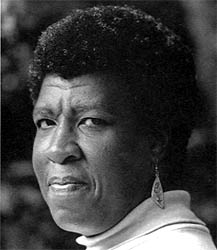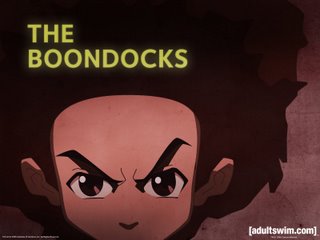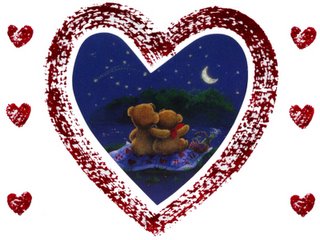A Legend in Sci-Fi: Octavia E. Butler

Below is a message sent by a co-worker about one of my most favorite and cherished authors. She was quite an amazing woman, and I am grateful that I had an opportunity to simply be in her presence at a book signing she gave last October with the release of her book, Fledgling.
Ms. Butler was a writer far beyond our time with incredible foresight and imagination into what could possibly be. In a word, brilliant would best describe her and her work. If you've never delved into the world of science fiction, I would strongly suggest checking out her novels, short stories and essays. She definitely put people of color on the map in this genre, and I'm more enriched from having the experience.
*****************************************************************
It is with enormous sadness and regret that I inform you of the passing of author Octavia E. Butler.
Butler was a cherished fixture since the late 1980’s. She’s authored 14 books including Dawn, Wild Seed, Parable of the Sower and Parable of the Talents, as well as the forthcoming Fledgling, which was a critical success when released in October 2005 by her small hardcover press. She was a towering figure in life and in her art and the world noticed: She received numerous awards including both the Hugo and Nebula awards, a MacArthur “genius” grant, the Langston Hughes Medal, as well as a PEN Lifetime Achievement award.
The AP wire obit which ran in the NY Times online is available through this link:
Butler was a cherished fixture since the late 1980’s. She’s authored 14 books including Dawn, Wild Seed, Parable of the Sower and Parable of the Talents, as well as the forthcoming Fledgling, which was a critical success when released in October 2005 by her small hardcover press. She was a towering figure in life and in her art and the world noticed: She received numerous awards including both the Hugo and Nebula awards, a MacArthur “genius” grant, the Langston Hughes Medal, as well as a PEN Lifetime Achievement award.
The AP wire obit which ran in the NY Times online is available through this link:
Our thoughts are with her family and friends. Octavia will be sorely missed, but her powerful words and fiction will live on.
*****************************************************************
Octavia Butler (b. 1947 - 2006)
Octavia Estelle Butler is the first African-American woman to gain popularity and critical acclaim as a major science fiction writer. She was born on June 22, 1947 in Pasadena, California, to Laurice and Octavia M. (Guy) Butler. Butler was the only child of five pregnancies that her mother was able to carry to term. Her father, a shoeshine man, died when Butler was very young. Most of her memories are actually stories that she heard from her mother and grandmother. Her mother and she lived in a very racially mixed neighborhood. The unifying factor was the struggle to make ends meet. Butler "never personally experienced the more rigid forms of a segregated society" Butler was very shy in school, and describes herself as a daydreamer. These factors made it very difficult to succeed in school. She overcame dyslexia, and began writing when [she] was 10 years old...to escape loneliness and boredom.. At age twelve she became interested in science fiction.
Butler's patternists series, published between 1976 and 1984, tells of a society that is run by a specially-bred group of telepaths. This is an elite group who are mentally linked to one another in a hierarchical pattern. These telepaths are trying to create a superhuman race. This series includes the books: Patternmaster, Mind of My Mind, Survivor, Wild Seed, and Clay's Ark. Patternmaster deals with the struggle between brawn and brain. It also comments on class structure and the role of women. Wild Seed incorporates a great deal of the Black experience, including slavery. Dawn, Adulthood Rites, and Imago are the three novels that make up the Xenogenesis trilogy. These stories are about the near destruction of humankind through nuclear war and gene-swapping by extraterrestrials. The extraterrestials observe the humans as being hierarchical, which cause them to be prejudiced, and to have class divisions and conflict. These characteristics make it inevitable that mankind will eventually destroy itself without the aliens' help.



 The legend contends that Valentine was a priest who served during the third century in Rome. When Emperor Claudius II decided that single men made better soldiers than those with wives and families, he outlawed marriage for young men -- his crop of potential soldiers. Valentine, realizing the injustice of the decree, defied Claudius and continued to perform marriages for young lovers in secret. When Valentine's actions were discovered, Claudius ordered that he be put to death. Other stories suggest that Valentine may have been killed for attempting to help Christians escape harsh Roman prisons where they were often beaten and tortured.
The legend contends that Valentine was a priest who served during the third century in Rome. When Emperor Claudius II decided that single men made better soldiers than those with wives and families, he outlawed marriage for young men -- his crop of potential soldiers. Valentine, realizing the injustice of the decree, defied Claudius and continued to perform marriages for young lovers in secret. When Valentine's actions were discovered, Claudius ordered that he be put to death. Other stories suggest that Valentine may have been killed for attempting to help Christians escape harsh Roman prisons where they were often beaten and tortured.